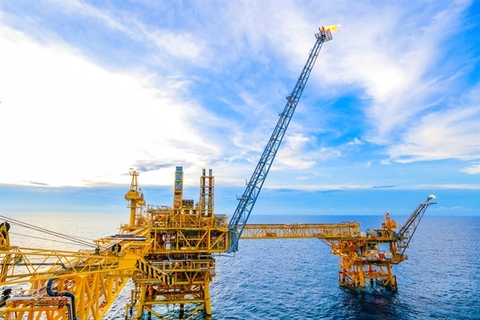
Sư Tử Trắng (While Lion) oil field of the National Oil and Gas Group. It is critical to continue improving institutions and the legal framework to promote the efficient use of State capital and enhance transparency in the operation of SOEs. — VNA/VNS Photo
Prime Minister Phạm Minh Chính urged State-owned enterprises (SOEs) to take the lead in promoting innovation, accelerating digital transformation and enhancing competitiveness towards ensuring efficient State capital use and green growth.
Chính was speaking at an online conference on Thursday to raise solutions for SOEs to promote production and business and increase investment for socio-economic development.
Stressing the important role of SOEs in ensuring macroeconomic stability and promoting socio-economic development, Chính urged efforts to remove difficulties for enterprises, including policy bottlenecks and internal problems and raise timely and effective solutions towards promoting innovation and efficiency at SOEs.
SOEs should take the lead in promoting innovation, enhancing competitiveness, accelerating digital transformation, green transformation, circular economy, sharing economy and emerging sectors, Chính said.
Chính said that the Government and SOEs need to join hands together to overcome the difficult time and increase investment to realise growth targets of 2023 and following years with the spirit of harmonising benefits and sharing risks.
The focus should be placed on improving institutions and the legal system to raise resources for development investment, he said, adding that it was critical to simplify administrative procedures, and reduce input and compliance costs for enterprises.
The restructuring of SOEs must also focus on improving labour productivity, capital efficiency and income of employees.
Chính also urged SOEs to participate actively in implementing the Government’s three strategic breakthroughs in institutions, infrastructure and human resources and major projects such as expressway system development, green transition, climate change adaptation, digital transformation, social housing development and 1-ha high-quality rice plantation in Mekong River Delta.
Dialogues with SOEs would be held every three months to remove difficulties for enterprises, he said.
Chính also urged mechanisms and policies to be raised to encourage and inspire those who dare to think, dare to do and dare to create breakthroughs for the common good.
SOEs should effectively take opportunities from free trade agreements and the diplomatic relationship with countries around the world, Chính said.
He added that human resource training for emerging sectors such as digital transformation, climate change adaptation, green growth, circular economy and sharing economy was important.
Chính asked ministries, agencies and local authorities to create the most favourable conditions for enterprises to overcome the difficulties and encourage date-to-do spirit.
The Ministry of Planning and Investment said that it was critical to continue improving institutions and the legal framework to promote the efficient use of State capital and enhance transparency in the operation of SOEs.
SOEs also needed to enhance their operation efficiency and competitiveness based on technology, innovation and international- standard governance, the ministry said.
The ministry added that Việt Nam needed to develop large-scale SOEs which were capable of competing in the international market in some sectors to play key roles in the economy, such as energy (renewable and clean energy), infrastructure, finance, telecommunications technology, semiconductor industry and core technology.
The ministry’s report showed that there were about 478 wholly State-owned SOEs and 198 SOEs in which State held controlling stakes.
Wholly State-owned SOEs accounted for around 7 per cent of the total assets of 10 per cent of the total chartered capital of the entire enterprises operating in the market, 25.78 per cent of the total capital for production and business and 23.4 per cent of the total fixed asset value.
SOEs contributed around 28 per cent to the State budget, and created 700,000 jobs, or 7.3 per cent of the total labour force of enterprises.
The report also pointed out that SOEs played a controlling role in key sectors of the economy, such as electricity with EVN, TKV and PVN accounting for around 87 per cent of the electricity supply, petroleum, where SOEs held a retail market share of 84 per cent, oil exploitation and economic infrastructure.
The total asset of SOEs was estimated at VNĐ3.8 quadrillion as of the end of 2022, representing an increase of 4 per cent against 2021.
SOEs’ revenue was estimated at VNĐ689.5 trillion in the first half of this year with a pre-tax profit of more than VNĐ67 trillion, or 63 per cent of the plan for the full year.
SOEs were expected to earn a total revenue of VNĐ1.4 quadrillion this year, a rise of 4 per cent over the plan with a pre-tax profit of VNĐ117.3 trillion, up by 9 per cent, and contributed VNĐ128.8 trillion to the State budget, up 7 per cent. — VNS